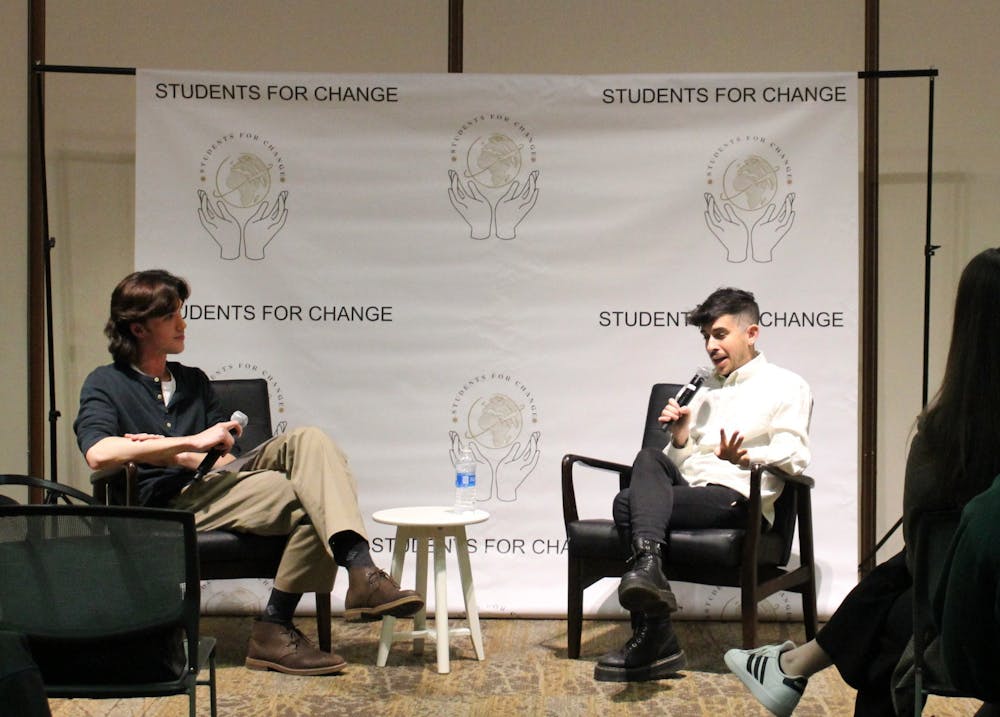Chase Strangio, the deputy director for Transgender Justice at the ACLU LGBTQ & HIV Project, spoke about the importance of storytelling and community-focused advocacy at an International Transgender Day of Visibility event with American University Students for Change on March 27.
Strangio discussed both his work in impact litigation at the ACLU and the Sylvia Rivera Law Project representing gender-nonconforming individuals in incarceration settings. Through the discussion, he also drew from his own experiences with being trans in America.
Strangio said he didn’t originally want to be a lawyer, but saw it as a tangible path forward to “assert [himself] against people's dismissive understanding of me” when he felt lost as a young person looking to make change.
Sharing stories, Strangio said, is just as critical as legal change because these stories reach more people, which prompts further legal change. He added that one of the benefits of Supreme Court Cases — such as the 2020 decision that Title VII of the Civil Rights Act of 1964 prohibits discrimination against transgender people, which Strangio worked on — is that they draw more attention and center national conversation on trans rights and other issues.
“Storytelling is an entry point into people's understanding of someone else's humanity,” he said. “And if we don't just have stories about trans people proliferating with all of the messy human nuance that all human stories hold, then we're not going to feel human to people who think they don't know us, and that means judges and lawmakers and others.”
These stories will help show something he said he wishes more people understood about the experience of being trans: the liberation and joy that comes alongside the struggle.
“Every trans person has, in some sense, been told in every way that they can't be who they are and have been able to recognize the truth about themselves despite that,” Strangio said. “And so I think there's a lot of power in that there's a lot of emancipatory power in that.”
Having spent more than 11 years with the ACLU, Strangio said he avoids burnout by having fun and enjoying the people he works with. This effort, he said, keeps him connected to the communities he works with and working towards the world they want to see.
“I think that we make the most and the best change when we’re living our fullest and happiest lives,” he said. “And so I think if we ask ourselves: ‘What is the community we want? What are the material conditions we want to manifest for the people that we love?’ Then, that connects us to the work.”
He critiqued the definition of impact litigation — legal work that aims to change laws to prompt social change — by saying that “every time you engage in the law, you change it in some way.” He said while he struggles with the fact that impact litigation requires seeking out plaintiffs to build cases, he tries to always consider how these cases can change long-standing structures like the gender binary and civil marriage.
“That’s my operating question, sort of looking across the country: ‘What is it that the government is doing that's causing the most harm? And how can we disrupt that?’” he asked. “And so that is one of the considerations that I want to bring forward is not always the most salient. So I have to push back on that.”
Strangio added that he struggles with his role as a lawyer because, even when trying to reform policies and empower people through them, the legal system is “structurally designed to maintain power.” He said he connects with community groups that help him think “in a more imaginative, transformative place” and thinks about the potential for future impact.
Still, Strangio said he hopes that his work can help empower people and create lasting changes.
“But at the end of the day, if there’s a space for people to fight back against the government when it's discriminating against you, that can be a really empowering experience in addition to a traumatizing one,” he said. “And so trying to figure out ways to help people find more voice through the process, rather than feel like their voice is being stamped out.”
In words of advice to the audience, Strangio encouraged students to find people who “exhilarate” them in their journey to find what’s possible to change in the world.
“Be patient with yourself and kind to yourself, because the world is hard enough,” he said. “Everything that you're doing to embody your path and create joy in your life is actually part of the process of transforming the world that we live in.”
This article was edited by Samantha Skolnick, Zoe Bell, Abigail Turner and Abigail Pritchard. Copy editing done by Luna Jinks, Isabelle Kravis and Ariana Kavoossi.





